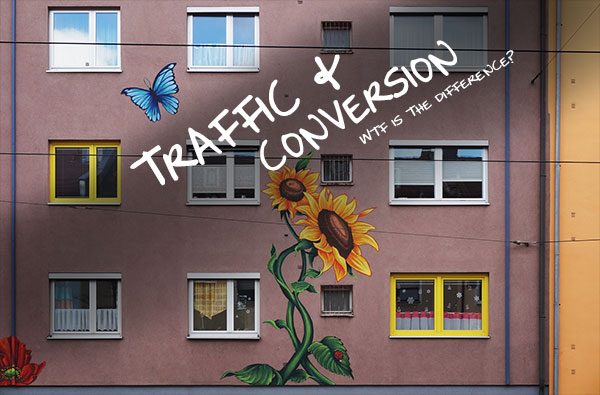
SEO: Traffic vs Conversion: What’s the difference and what’s more important?
Say you have a website, and you do some SEO (Search Engine Optimisation) work to get more traffic to it. The usual way people ask us to do this is “Please get me to the top of Google”. And more specifically “Please get me to the top of Google when people search for [whatever your business does]”.
However, it’s important to differentiate what that means. In essence:
- Traffic: How many people visit your site
- Conversion: How many of those get in touch with you, allowing you to move them from “lead” to “prospect” and start a real business relationship with them.
You can get to the top of Google pretty quickly by paying Google through their “Ad Words” service. Or you can take the longer route and do this by making your website “optimised” for the search terms. But either way, you’d be wasting all that traffic if you don’t consider making your website work harder for you. To be high performing, your website should have 3 elements:
- Appeal: The site should create an excellent first impression – with a great fresh design, clear navigation and well-written copy.
- Stickiness: The site should be engaging and interesting
- Relevance: The site needs to reassure people that they have come to the right place
So conversion is important – but what about traffic?
Both are important! But we recommend that while people visit your site first, then convert to customers, your site should first be created with appeal, stickiness, and relevance, and THEN you can invest in SEO and bringing in more traffic. See our other article 3 types of Google search results: the difference between “Organic” and “Sponsored” SEO.
How to make visitors more likely to stay on your site, and get in touch
For that, you need them to not only click a link but to find in front of them what they are looking for. Your site needs to communicate that you are the best decision. Through your website you need to do three things:
- Build credibility: This means that you seem trustworthy. You do this with things like reviews, testimonials, case studies about successful projects/clients you’ve helped, and a team page which transparently shows who is in the business, their knowledge and experience. In addition, the design should be consistent and professional and the copywriting (the words you’ve used in headlines, bullets, captions and paragraphs)
- Show your business personality: In order to differentiate yourself, you need also to show the human side of the people. In a real-life situation, when you meet a prospect or answer an enquiry, you have the advantage of the human conversation and your charisma and charm to break the ice, ask relevant questions (showing interest) and explain how you will help them clearly. You would in real life be helpful and approachable. To do this on the website is more challenging, as you only have your images, your words, and your graphic elements at your disposal. However, there are several ways to show personality on a website: in the way that you write, on your team page, and in your blog stories and insights. You would also do this on your social media profiles and your content, so by the time people come to your site, they already feel they know you.
- Show you’re still there: Recent blog posts, current information, and other indications you’re an active business with lots of great stuff going on shows that you care about how you’re coming across, you’re accessible, and there is a level of transparency on the current business dealings.
For example, our SEO partner Tom’s client, a home care agency called Adada Care Services in Chester, has a “Book A Free Consultation” link going to the contact page, prominent on every page onsite. This is a simple but effective method of enticing more enquires from the website’s visitors.
So which is more important?
It depends on your business goals. Some people have a website just to have something to show when they meet people, or for people to click on when they get an email from them. For others, they need their website to bring them leads that turn into sales. If you are the latter, then I would consider both important, but start with getting your website in top notch shape, using the advice above, so you take proper advantage of any traffic you do generate through SEO activity.
For example, a client of our SEO partner Tom, Phyconcierge Medical Concierge gets limited traffic via SEO & Google ads due to the limited search demand for Medical Concierge in London keywords. However this still leads to a good conversion rate, as some of the limited number of visitors each month go on to enquire either by email or filling out their form. This also applies to Phycore, who specialise in Medically Led Fitness Programs and Doctor Led Personal Training.